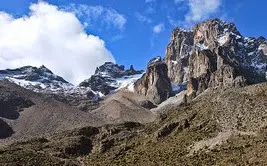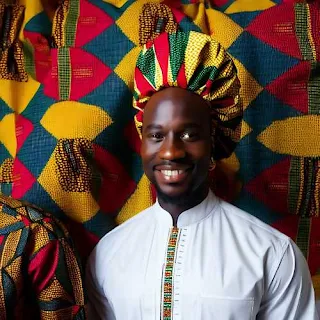Origin of Kenyan Gikuyu Tribe Legend, Gikuyu Facts, explanation of Ngai Belief System.
The Gikuyu people traditionally follow a belief system known as Ngai, which refers to a supreme being or God. They believed in ancestral spirits and practiced various rituals and ceremonies to communicate with the spiritual realm.
The Gikuyu people have a deep-rooted spiritual belief system that is centered around their relationship with a supreme being or God known as Ngai. Ngai is considered the creator and sustainer of all things and is believed to reside on Mount Kenya, which is considered a sacred place by the Gikuyu people.
The Gikuyu people believe that Ngai has the power to influence their lives and the natural world around them. They see Ngai as the provider of rain, fertility, and blessings and offer prayers and sacrifices to seek Ngai's favor and protection.
Ancestral spirits also hold a significant place in Gikuyu spirituality. The Gikuyu believe that their ancestors continue to exist in the spiritual realm and can intercede on their behalf. They honor their ancestors through rituals and ceremonies, seeking their guidance, blessings, and protection. Ancestors are considered a source of wisdom and are seen as a link between the living and the spiritual world.
The Gikuyu people perform various rituals and ceremonies to communicate with the spiritual realm. These rituals often involve prayers, songs, dances, and offerings. They may offer sacrifices of livestock, grains, or other items that hold symbolic value to show their devotion and gratitude to Ngai and the ancestors.
The Gikuyu also have specific religious leaders known as medicine men or diviners who act as intermediaries between the community and the spiritual realm. These individuals possess knowledge and skills passed down through generations and are consulted for spiritual guidance, healing, and divination.
Rituals and ceremonies play a significant role in Gikuyu culture, marking important milestones such as birth, initiation, marriage, and death. These rituals are seen as a way to maintain harmony and balance between the physical and spiritual worlds, ensuring the well-being and prosperity of the community.
While Christianity and other religions have gained popularity among some Gikuyu individuals, traditional spiritual beliefs and practices still hold strong cultural significance and are celebrated and honored by many Gikuyu people today. The belief in Ngai and ancestral spirits remains integral to the Gikuyu identity and cultural heritage, connecting them to their past, present, and future.
Gikuyu Tribe Ngai Facts
- Kere-Nyaga, also known as Mount Kenya, is a place for prayers and sacrifices.
- The common name used when addressing “the possessor of all” is Ngai.
- Numbering about 6 million, the Gikuyu people are the largest ethnic group in Kenya.
- While praying the Gikuya people address Ngai as Mwene-nyaga.
- The Gikuyu name for Mount Kenya is also Mwene-nyaga.
- The Gikuyu God and possessor of all is Mwene-nyaga meaning owner of the snow, possessor of brightness, or possessor of the white patch.
- Mwene-nyaga lives on Mount Kenya, also known as Kere-Nyaga.
- The Gikuyu pray under large sacred trees such as fig trees, where prayers and sacrifices are offered.
Origin of the Gikuyu Tribe Legend
Mogai, the divider of the universe, called a man named Gikuyu to him and took him to the top of Kere-Nyaga (Mount Kenya). Mogai pointed out the lush lands and informed the Gikuyu man all is his; if he is ever in need, raise his hands toward Kere-Nyaga and pray.
Mogai provided a wife to Gikuyu named Moombi, and they created nine beautiful daughters. However, Gikuyu wanted a son to carry on his name. Mogai told Gikuyu not to worry and make sacrifices to the mountain Kere-Nyaga where the God Ngai lives, but he must do this while standing under a fig tree. Mogai told Gikuyu if he did as told, he would be blessed with nine handsome, strong young men to marry his beautiful nine daughters.
Gikuyu did as he was told, making sacrifices for Kere-Nyaga. When he returned to the fig tree in the morning, he found nine young men waiting patiently under the fig tree. The men married Gikuyu’s daughters and continued to live on the land for generations, still praying and giving thanks to the mountain Kere-Nyaga where the God Ngai dwells.
Famous Gikuyu people who have made significant contributions
- Jomo Kenyatta — First President of Kenya and key independence leader.
- Wangari Maathai — Environmentalist, activist, and Nobel Peace Prize laureate.
- Ngugi wa Thiong'o — Influential Kenyan writer and academic.
- Mary Wambui — Politician and advocate for women's empowerment.
- Charles Njonjo — Kenya’s first Attorney General and human rights advocate.
- Mwai Kibaki — Third President of Kenya, known for economic reforms.
Frequently Asked Questions about the Gikuyu Tribe
Who is Ngai in Gikuyu belief?
Ngai is the supreme God in Gikuyu spirituality — the creator and sustainer of all things. The Gikuyu believe Ngai lives on Mount Kenya and provides rain, fertility, and blessings.
What is the Gikuyu tribe origin legend?
According to legend, Mogai (God) called Gikuyu to the top of Mount Kenya, gave him land, and later provided nine men to marry his nine daughters, forming the Gikuyu clans.
Where do the Gikuyu offer prayers and sacrifices?
The Gikuyu pray under sacred fig trees facing Mount Kenya (Kere-Nyaga) to honor Ngai and their ancestors, seeking blessings and protection.
Do Gikuyu people still practice traditional spirituality today?
Yes. While many have embraced Christianity, traditional Ngai worship and ancestral rituals remain culturally important and are practiced alongside modern faiths.



























